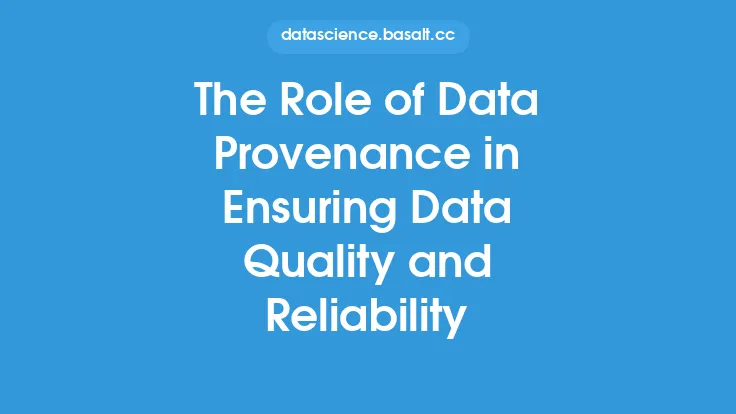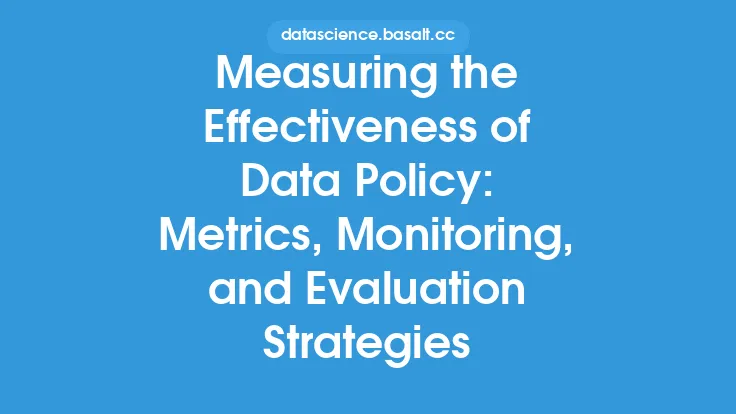Data quality and integrity are essential components of any organization's data management strategy. With the increasing reliance on data to inform business decisions, ensure regulatory compliance, and drive innovation, it is crucial to have a robust data policy in place to guarantee the accuracy, completeness, and consistency of data. A well-crafted data policy provides a framework for managing data throughout its lifecycle, from creation to disposal, and ensures that data is handled in a way that maintains its quality and integrity.
Introduction to Data Policy
A data policy is a set of guidelines, rules, and procedures that govern the management of data within an organization. It outlines the responsibilities and expectations for data management, including data collection, storage, processing, and dissemination. A data policy should be designed to ensure that data is accurate, complete, and consistent, and that it is handled in a way that maintains its quality and integrity. This includes ensuring that data is properly documented, stored, and protected, and that access to data is controlled and audited.
Key Components of a Data Policy
A comprehensive data policy should include several key components, including data governance, data quality, data security, and data compliance. Data governance refers to the overall management and oversight of data, including the establishment of policies, procedures, and standards for data management. Data quality refers to the accuracy, completeness, and consistency of data, and includes procedures for ensuring that data is properly validated, verified, and corrected. Data security refers to the protection of data from unauthorized access, use, or disclosure, and includes procedures for encrypting, backing up, and recovering data. Data compliance refers to the adherence to regulatory requirements and industry standards for data management, including procedures for ensuring that data is handled in accordance with relevant laws and regulations.
Data Quality and Integrity
Data quality and integrity are critical components of a data policy. Data quality refers to the accuracy, completeness, and consistency of data, and includes procedures for ensuring that data is properly validated, verified, and corrected. Data integrity refers to the assurance that data is not modified, deleted, or corrupted, either intentionally or unintentionally, and includes procedures for ensuring that data is properly backed up, recovered, and audited. A data policy should include procedures for ensuring data quality and integrity, including data validation, data verification, data correction, and data auditing.
Data Validation and Verification
Data validation and verification are essential procedures for ensuring data quality and integrity. Data validation refers to the process of checking data for accuracy and completeness, and includes procedures for ensuring that data is properly formatted, coded, and documented. Data verification refers to the process of checking data against external sources, such as reference data or external databases, to ensure that it is accurate and consistent. A data policy should include procedures for data validation and verification, including the use of data validation rules, data verification checks, and data quality metrics.
Data Security and Compliance
Data security and compliance are critical components of a data policy. Data security refers to the protection of data from unauthorized access, use, or disclosure, and includes procedures for encrypting, backing up, and recovering data. Data compliance refers to the adherence to regulatory requirements and industry standards for data management, including procedures for ensuring that data is handled in accordance with relevant laws and regulations. A data policy should include procedures for ensuring data security and compliance, including data encryption, data backup and recovery, and data auditing.
Data Governance and Stewardship
Data governance and stewardship are essential components of a data policy. Data governance refers to the overall management and oversight of data, including the establishment of policies, procedures, and standards for data management. Data stewardship refers to the responsibility for ensuring that data is properly managed and maintained, and includes procedures for ensuring that data is accurate, complete, and consistent. A data policy should include procedures for data governance and stewardship, including the establishment of data governance boards, data stewardship roles, and data management procedures.
Implementing a Data Policy
Implementing a data policy requires a comprehensive approach that includes the establishment of policies, procedures, and standards for data management. This includes the development of a data governance framework, the establishment of data stewardship roles, and the implementation of data management procedures. A data policy should be communicated to all stakeholders, including employees, customers, and partners, and should be regularly reviewed and updated to ensure that it remains effective and relevant.
Monitoring and Auditing Data Policy
Monitoring and auditing a data policy are essential procedures for ensuring that it is effective and compliant. Monitoring refers to the ongoing review and assessment of data management practices, including the review of data quality metrics, data security controls, and data compliance procedures. Auditing refers to the periodic review and assessment of data management practices, including the review of data governance procedures, data stewardship roles, and data management procedures. A data policy should include procedures for monitoring and auditing, including the establishment of data quality metrics, data security controls, and data compliance procedures.
Conclusion
In conclusion, a data policy is a critical component of any organization's data management strategy. It provides a framework for managing data throughout its lifecycle, from creation to disposal, and ensures that data is handled in a way that maintains its quality and integrity. A comprehensive data policy should include key components such as data governance, data quality, data security, and data compliance, and should be designed to ensure that data is accurate, complete, and consistent. By implementing a data policy, organizations can ensure that their data is of high quality, secure, and compliant with regulatory requirements, and can make informed decisions based on accurate and reliable data.





